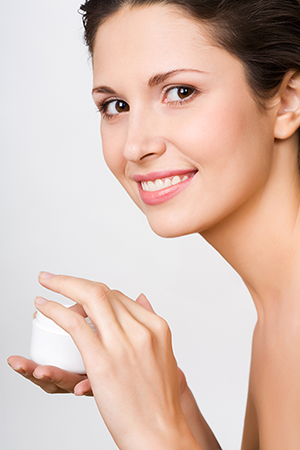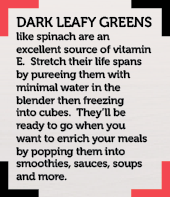By Anja Springthorpe

 Vitamin E is not only important for a healthy immune system, it is essential for the maintenance of healthy, glowing skin. You may have noticed that many skin care products contain the nutrient vitamin E – and for good reason.
Vitamin E is not only important for a healthy immune system, it is essential for the maintenance of healthy, glowing skin. You may have noticed that many skin care products contain the nutrient vitamin E – and for good reason.
Rather than being one nutrient, vitamin E is a group of eight compounds with similar chemical structures, all of which are potent antioxidants. Antioxidants are needed to combat free radicals, highly unstable compounds that damage our cells, DNA, and other tissues, and hence greatly contribute to the skin-aging process. Free radicals result as a normal part of our metabolism, but pollution, chemicals, smoking and alcohol are all factors contributing to increased levels of free radicals. To keep these in check, we need antioxidants such as vitamin E. Since vitamin E is fat-soluble, it works well in tissues like skin and hair follicles to provide significant resistance to cellular damage and aging.
 Plenty of research confirmed the effectiveness of vitamin E when it comes to skin health. Apart from protecting the skin from free radicals, vitamin E additionally protects the top layer of skin from UV radiation – a leading cause of wrinkle acceleration and loss of complexion. Because vitamin E is so essential to skin health, it is effectively used to treat scarring.
Plenty of research confirmed the effectiveness of vitamin E when it comes to skin health. Apart from protecting the skin from free radicals, vitamin E additionally protects the top layer of skin from UV radiation – a leading cause of wrinkle acceleration and loss of complexion. Because vitamin E is so essential to skin health, it is effectively used to treat scarring.
Vitamin E oils for topical use are readily available, but be cautious of the purity and quality of the products you choose. Ideally, any vitamin E oil contains all eight members of the vitamin E family as well as vitamin C, which increases the stability and shelf-life of the oil. Oils can leave a heavy film on the skin, and therefore application at night is often preferable.
Should we apply vitamin E to the skin or consume it through the diet? Because vitamin E is needed for a number of important functions throughout the body, we need to ensure adequate dietary intake rather than merely relying on creams and oils, as these products only support vitamin E levels in the skin.
Luckily it is not hard to come by great sources of vitamin E. Foods such as seeds, nuts, avocados, fish, plant oils and green leafy vegetables are all good choices to boost your vitamin E intake. While there are vitamin E supplements available, food sources are always superior, safer and certainly more nutritious.



